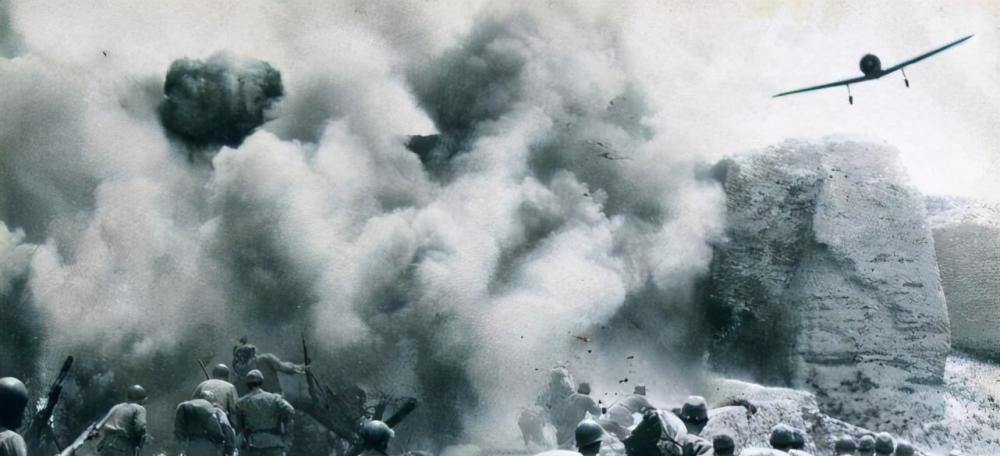Welcome to The History column No. 1881. After the Lugou Bridge Incident in 1937, the Sino-Japanese War evolved into a nationwide war of resistance, and in the face of the continuous increase in japanese aggression, the whole country showed a very high anti-Japanese fighting spirit. In terms of the division of labor in operations, the combat units of the Nationalist Army were millions, mainly responsible for engaging the Japanese and Kou on the frontal battlefield, and performed remarkablely in many battles in the early stages, while the Eighth Route Army, the New Fourth Army and other units of our army also had very good achievements in the battlefield behind the enemy lines.

Due to historical reasons, the Kuomintang army not only had Chiang Kai-shek's central army, but also many warlords in various places with good strength, and during the War of Resistance Against Japanese Aggression, a large number of troops were dispatched to repel the Japanese. As one of the most powerful local armies at that time, the Gui clan gave almost everything to it in the early stage of the War of Resistance, and the proud Seventh Steel Army basically ran out when defending Shanghai in 1937; and the more famous victory of the Chinese Army in the War of Resistance against Japanese Aggression was also the contribution of local factions: in 38 years, Li Zongren of the Gui clan commanded the Battle of Taierzhuang, and in the defense of Tengxian in this battle, Wang Mingzhang, commander of the Sichuan Army, led thousands of brothers to die in battle.
Another example is the Northeast Army (although the three eastern provinces were lost in 1931), the Northwest Army, and the Dian Army also invested a lot of troops in the period of the all-out War of Resistance, even the fierce defense of Nanjing, although the final failure was also commanded by tang Shengzhi, the commander of the Xiang Army and a first-class general, and some warlords with extremely bad reputations also joined the war, and Liu Xiang, the king of Sichuan, died of illness after leaving Sichuan, and before his death, he instructed his generals not to return to Sichuan without breaking the Japanese Kou. Warlords and bigwigs everywhere, the overall performance of this period can be said to be relatively selfless.
Han Fuqu (from the Northwest Army), who was executed in 1938 for escaping from the battlefield, actually fought with the Japanese army before abandoning Shandong, but his performance was not firm enough. But there will be two sides to everything, although the anti-Japanese enthusiasm of the whole country is so high, there are two powerful warlords who always take their own interests as the starting point, do nothing, pay no attention to the invasion of the Japanese army, and basically make no contribution at the military level. Who are these two people?
The first is Sheng Shicai. During the War of Resistance Against Japanese Aggression, Sheng Shicai controlled Xinjiang, but due to its remote geographical location, Sheng Shicai did not send troops for the front line of the War of Resistance on the grounds that the road was long and the territory was stable. During the War of Resistance Against Japanese Aggression, Sheng Shicai took the opportunity to develop his own forces, not only exploiting the people locally but also colluding with foreign forces, using power to seek internal and external balance, so as to seek benefits. However, although Sheng Shicai had his own little ninety-nine, he eventually overturned the car: the Japanese army was unable to penetrate deep into the northwest inland, and Sheng Shicai's rule was disintegrated from within, and in 1944 Sheng Shicai vigorously cleaned up the central government and military officials arranged by Lao Jiang in Xinjiang, which caused disasters, and finally Lao Jiang sent the central army led by Tao Zhiyue to force the palace, and Sheng Shicai collapsed.
Another warlord was Liu Wenhui. During the War of Resistance Against Japanese Aggression, Liu Wenhui was in charge of Xikang and held the local military and political power, but he did not send a soldier to support the anti-Japanese front, which was a world of difference compared with Deng Xihou, Liu Xiang, Yang Sen and others who were also from the Sichuan Army. His only action during the War of Resistance was to donate half a million dollars, "meaning", which was only a drop in the bucket for the costly war. Liu Wenhui's intention was obvious: to prevent Old Chiang from sending troops into Xikang in the name of the War of Resistance and threatening Liu Wenhui's independent kingdom, so he reduced all his troops to Xikang's hometown to prevent any change. The tactics of warlord strife cannot be said to be unreasonable, but they are still somewhat narrow in the face of national righteousness.
For more exciting content, follow the History column